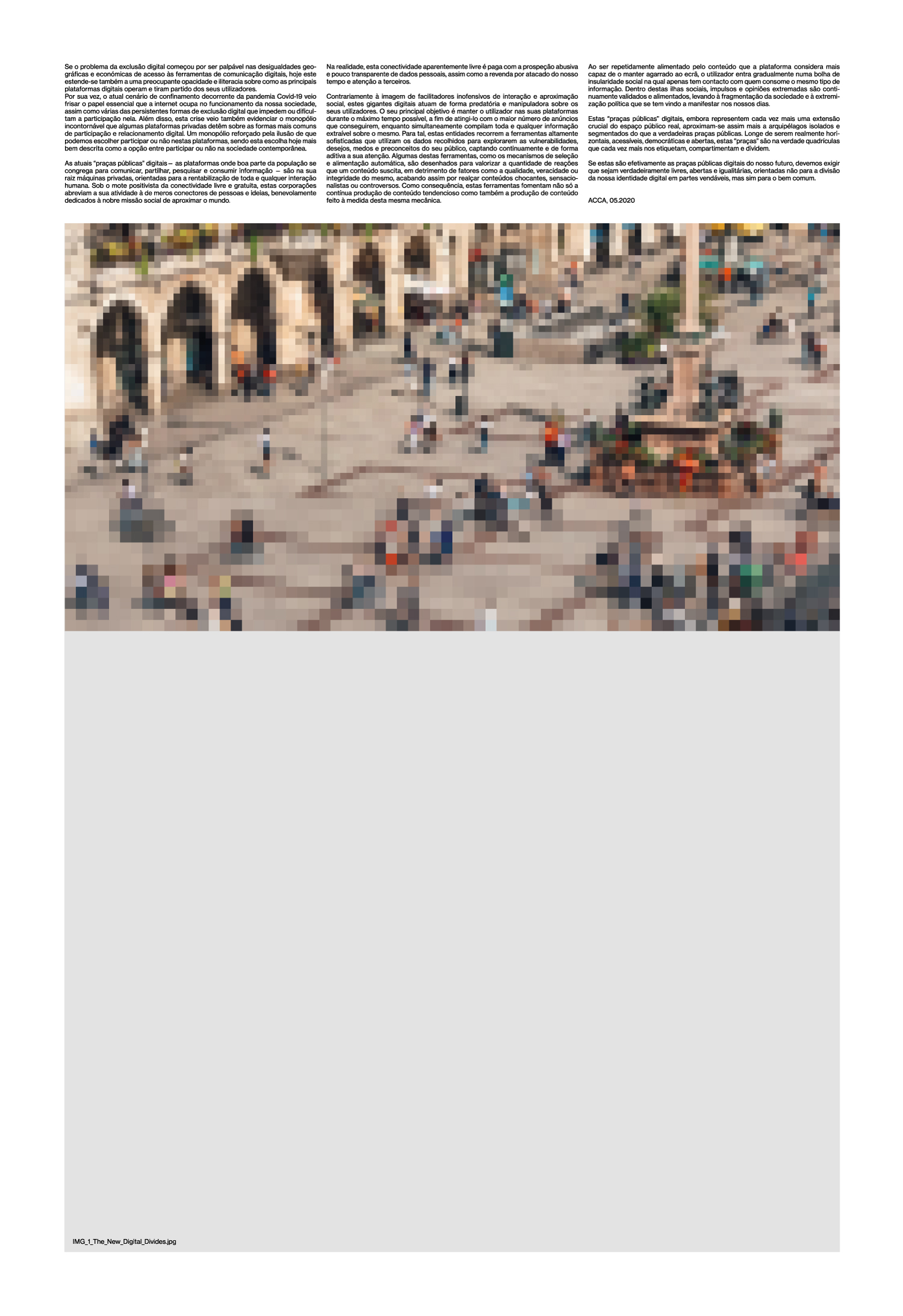A diptych print about the notion of a digital public square, composed of an essay and a set of manipulated images of public squares in Porto, presented as two large digital prints for backlit mupi displays, 2020.
Part 1 and 2 of a new series of works titled the new digital divides about the divisions and conditions of our digital sphere.

img_1_the_new_digital_divides.jpg
digital print (120x175cm), 2020
 img_2_the_new_digital_divides.jpg
img_2_the_new_digital_divides.jpg
digital print (120x175cm), 2020
If the problem of the digital divide began to be tangible through the geographical and economical inequalities of access to the tools of digital communication, today it also extends to a worrying opacity and illiteracy about how the main digital platforms operate and take advantage of their users.
In turn, the current scenario of confinement resulting from the Covid-19 pandemic has highlighted the essential role that the Internet plays in the functioning of our society, as well as several of the persistent forms of digital exclusion that prevent or hinder participation in it. In addition, this crisis has also highlighted the unavoidable monopoly that some private platforms have over the most common forms of digital participation and relationships. A monopoly reinforced by the illusion that we can choose to participate or not on these platforms, a choice better described now as the option between participating or not in contemporary society.
The current digital “public squares” – the platforms where a good part of the population congregates to communicate, share, search and consume information – are at their root private machines, oriented towards the profitability of any and all human interaction. Under the positivist motto of free and free connectivity, these corporations abbreviate their activity to that of mere connectors of people and ideas, benevolently dedicated to the noble social mission of bringing the world closer together. In reality, this seemingly free connectivity is paid for with the abusive and non-transparent prospection of personal data, as well as the wholesale of our time and attention to third parties.
Contrary to the image of harmless facilitators of social interaction and proximity, these digital giants act in a predatory and manipulative way over their users. Its main objective is to keep the user on their platforms for as long as possible, in order to reach them with as many ads as they can, while simultaneously compiling any and all extractable information about it. To this end, these entities use highly sophisticated tools that use the collected data to explore the vulnerabilities, desires, fears and prejudices of their audience, continuously capturing their attention. Some of these tools, such as the automated selection and feeding mechanisms, are designed to enhance the volume of reactions that a content elicits, to the detriment of factors such as quality, veracity or integrity, thus highlighting shocking, sensational or controversial content. In consequence, these tools encourage not only the continuous production of content that is biased, but also the production of content tailored to those same mechanics.
By being repeatedly fed by the content that the platform considers most capable of keeping him attached to the screen, the user gradually enters a bubble of social insularity in which he only has contact with those who consume the same type of information. Within these social islands, impulses and extreme opinions are continually validated and fed, leading to the fragmentation of society and the political polarisation that has become increasingly prominent in our days.
These digital “public squares”, although representing, more and more, a crucial extension of the real public space, are thus closer to the form of isolated and segmented archipelagos, than to real public squares. Far from being truly horizontal, accessible, democratic and open, these “squares” are in fact grids that increasingly label, compartmentalise and divide us.
If these are to be the digital public places of our future, we must demand that they be truly free, open and democratic, oriented not towards dividing our digital identity into saleable parts, but towards the common good.
ACCA, 05.2020




img_1_the_new_digital_divides.jpg, img_2_the_new_digital_divides.jpg
Porto, June 2020. Fotos by João Pádua
Presentations:
June 2020, Poético ou Político?, mupi exhibition in the city os Porto curated by João Baeta, Saco Azul / Maus Hábitos, Porto.